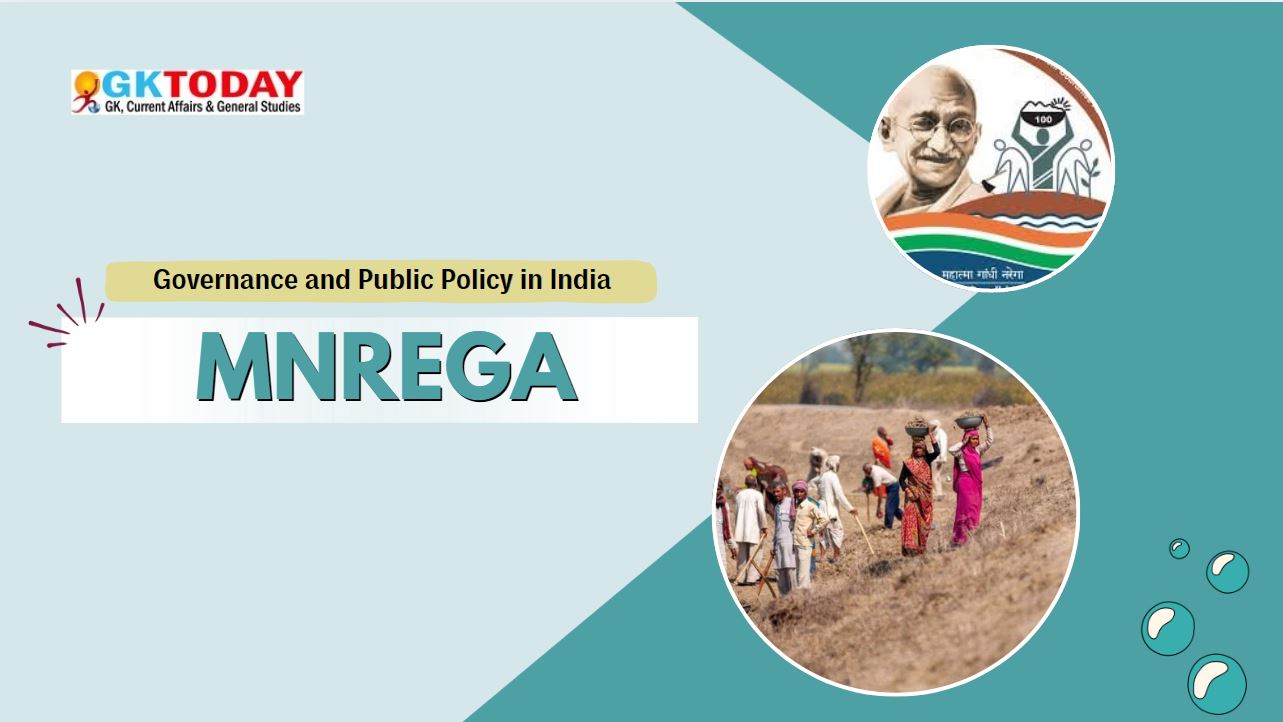MNREGA – Public Policy as an Instrument of Socio-Economic Development [NET Political Science Notes]
The Mahatma Gandhi National Rural Employment Guarantee Act (MNREGA) is a very important legislation in India, enacted in 2005. Its primary aim is to enhance livelihood security in rural areas by guaranteeing employment opportunities. This act serves as important tool for socio-economic development, addressing poverty and unemployment in rural communities.
Introduction to MNREGA
MNREGA was introduced to provide a legal guarantee of at least 100 days of unskilled wage employment to every rural household in a financial year. This initiative is designed to empower rural communities and improve their quality of life. The act puts stress on the government’s commitment to ensuring that every rural household has access to work and income.
Key Features of MNREGA
- Employment Guarantee: MNREGA provides a legal guarantee for at least 100 days of wage employment per year for every rural household.
- Wages: Minimum wages are determined by state governments, ensuring timely payment to workers.
- Work Types: The act focuses on unskilled manual work, such as water conservation, drought proofing, and rural infrastructure development.
- Self-Selection: Households can request work, and the government must respond within 15 days.
- Transparency and Accountability: Social audits and grievance redressal mechanisms enhance accountability.
Implementation of MNREGA
MNREGA is implemented by the Ministry of Rural Development in India. Local self-governments, known as Panchayati Raj Institutions, play a vital role in planning and executing projects. The funding for MNREGA is shared between the central and state governments, with the central government covering portion of the wage bill.
Eligibility Criteria
- Beneficiaries: All rural households are eligible, without any discrimination based on caste, creed, or gender.
- Application Process: Households must register with their local Gram Panchayat to access benefits.
Impact of MNREGA
MNREGA has had a deep impact on rural India. It has led to employment generation and income support for rural households. The act has also empowered rural labourers, particularly women, by increasing their participation in the workforce. Additionally, it contributes to the development of durable assets, enhancing rural infrastructure.
Employment Generation
The act has created millions of job opportunities in rural areas. For instance, during the COVID-19 pandemic, MNREGA provided a critical safety net for rural households facing economic hardships.
Income Support
By providing guaranteed employment, MNREGA helps reduce poverty and enhance food security. Households can rely on the income generated through this employment to meet their basic needs.
Empowerment
MNREGA promotes gender equality by encouraging women’s participation in the workforce. It increases their bargaining power and provides them with a sense of financial independence.
Infrastructure Development
The programme has led to the creation of essential infrastructure in rural areas. Projects include the construction of roads, irrigation facilities, and water conservation structures, which are vital for rural development.
Challenges in Implementation
Despite its successes, MNREGA faces several challenges. Corruption and delays in wage payments are issues that hinder its effectiveness. Additionally, there are concerns about the quality and sustainability of the assets created.
Implementation Issues
Corruption can lead to misallocation of funds, affecting the intended beneficiaries. Delays in wage payments can demotivate workers and reduce their trust in the system.
Quality of Work
While MNREGA aims to create durable assets, there are concerns regarding the quality of work. Some projects may not meet the required standards, leading to unsustainable outcomes.
Funding Constraints
The programme’s effectiveness is contingent on timely funding from the central government. Delays in fund allocation can disrupt project implementation and wage disbursement.
Amendments and Revisions
MNREGA has undergone several amendments to enhance its effectiveness. The 2013 amendment introduced provisions for the inclusion of additional types of work and improved accountability measures. Furthermore, digital initiatives, such as e-MNREGA, have been introduced to improve monitoring and transparency.
Current Status of MNREGA
As of recent reports, over 14 crore households are registered under MNREGA. The annual budget allocations for the programme have varied, with increased focus during economic downturns, such as the COVID-19 pandemic.
Coverage
The extensive coverage of MNREGA demonstrates its importance in rural employment generation. The act has become a lifeline for many households, particularly during crises.
Budget Allocation
Government budget allocations for MNREGA reflect its significance in addressing rural unemployment. Increased funding during economic crises marks the programme’s role in providing social security.
Related Schemes
MNREGA is part of a broader framework of rural development initiatives in India. Other related schemes include:
- National Rural Livelihoods Mission (NRLM): Aims to promote self-employment and the organisation of rural poor into self-help groups.
- Pradhan Mantri Awaas Yojana (Gramin): Focuses on providing housing for the rural poor, ensuring access to safe and secure shelter.


